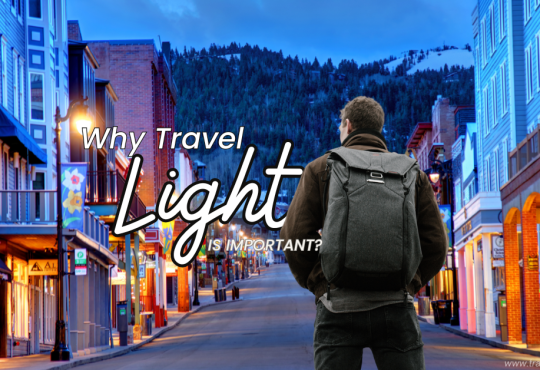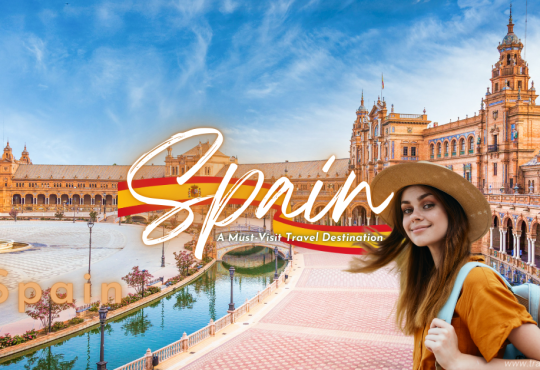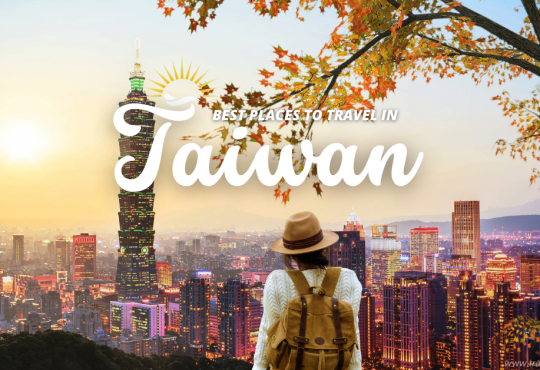Singapore: A Must-Visit City – The Best Time to Visit, Things to Do, Top Places, and Must-Try Foods
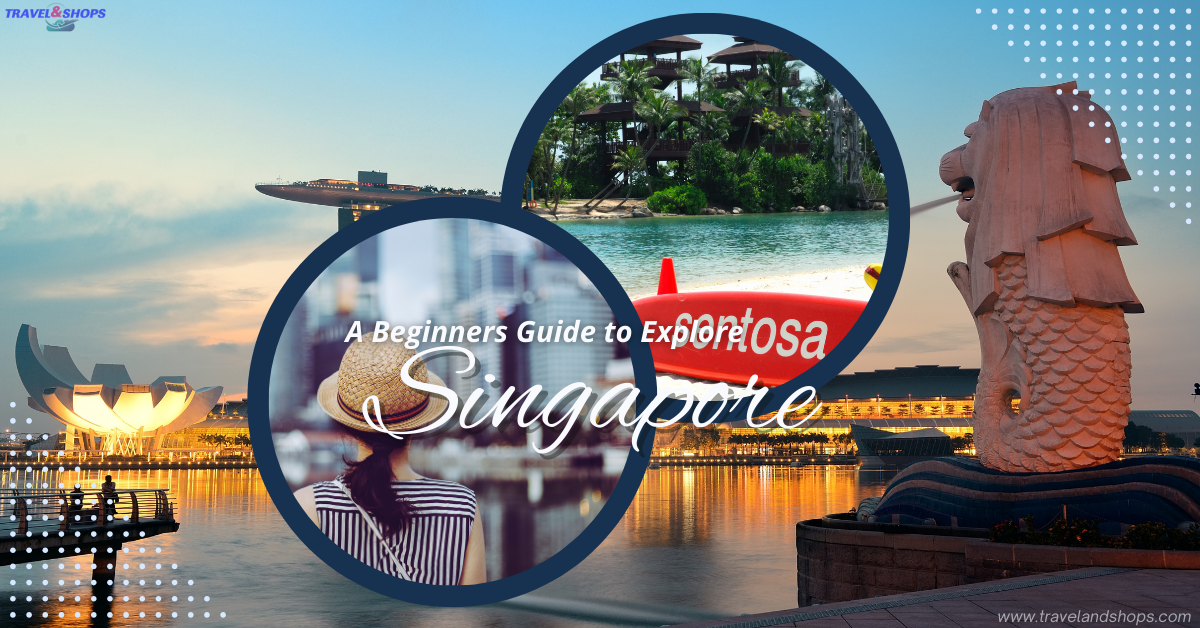
When it comes to exploring the best of Southeast Asia, Singapore consistently stands out as a must-visit city. This bustling city-state, packed with modern hub combines diverse cultures, world-class attractions, and mouthwatering cuisine, making it an unforgettable destination for travelers of all kinds. Whether you’re drawn to Singapore for its stunning architecture, vibrant food scene, or luxurious shopping, this city truly has it all. But to make the most of your time there, it helps to know when to visit, what activities to try, the best sights to see, and, of course, the tastiest foods to sample.
In this guide, we’ll take you through everything you need to know to plan the perfect trip to Singapore. From the ideal season to visit to top attractions and can’t-miss local dishes, you’ll get a full picture of why Singapore is not just another city but a place worth returning to again and again. So, if you’re ready to discover why Singapore is a must-visit city, keep reading and start planning your journey to one of the world’s most captivating urban landscapes.
Best Time to Visit Singapore
Given Singapore’s tropical climate, the weather remains relatively consistent throughout the year, with warm temperatures and high humidity. However, understanding the slight variations in weather patterns, crowd levels, and festivals can help you choose the best time for your travel goals. Here’s a closer look at each season and what makes it unique.
1. December to March—Dry and Cooler Season
- Weather: The period between December and March is often considered Singapore’s “cooler” season, with average temperatures ranging from 23°C to 31°C (73°F to 88°F). Humidity remains high but is generally lower than in the wet season. The dry season means fewer rainy days, though brief showers can still occur in the afternoons. Expect clear skies and sunny days, perfect for sightseeing.
- Festivals and Events: This time of year is packed with festivities. Christmas in the Tropics brings holiday decorations to Orchard Road, with glittering lights and themed displays. In January or February, Chinese New Year is celebrated with parades, cultural performances, and vibrant decorations, especially in Chinatown. March brings the Singapore International Festival of the Arts, showcasing the city’s diverse art scene.
- Crowd Level: This is the peak travel period in Singapore, with many tourists arriving for the holidays and festivals. Hotel prices can be higher during this season, and popular spots like Gardens by the Bay, Sentosa Island, and Marina Bay Sands may be busier. If you’re traveling during this time, booking accommodations in advance is wise.
2. April to June—Shoulder Season and Start of Southeast Monsoon
- Weather: April to June marks the beginning of the inter-monsoon period, with temperatures ranging from 25°C to 32°C (77°F to 90°F). Rainfall increases slightly in May and June, though showers are often brief and followed by sunshine. It’s a great time for those who want to avoid the heavier rains of the monsoon season while still enjoying warm, pleasant weather.
- Festivals and Events: April sees the Vesak Day celebrations, a major Buddhist festival marked by temple rituals and charity events. Hari Raya Puasa (Eid al-Fitr), which marks the end of Ramadan, is celebrated in May, with festive lights and bazaars across Kampong Glam and Geylang Serai. June brings the annual Great Singapore Sale, a shopping extravaganza with discounts across malls, making it the perfect time for bargain hunters.
- Crowd Level: As the weather is favorable but slightly more humid, there’s a moderate crowd level during this season. Hotel rates may drop slightly compared to peak season, making it a more budget-friendly time for visitors who still want to enjoy sunny days and festive events.
3. July to September—Monsoon Season with Food and Shopping Galore
- Weather: July to September falls within the Southwest Monsoon season, with more consistent rainfall. However, rains are usually light and may occur in the early mornings or late evenings, clearing up quickly. The temperatures hover between 26°C and 33°C (79°F to 91°F), and humidity is higher, which can make it feel warmer.
- Festivals and Events: July kicks off with the Singapore Food Festival, a month-long celebration featuring culinary events, street food, and exclusive menus across the city. The annual Singapore National Day on August 9th is celebrated with parades, fireworks, and the National Day Parade, bringing the whole city to life with patriotic pride. Mid-Autumn Festival (usually in September) also takes place around this time, with lantern displays and mooncakes available in Chinatown.
- Crowd Level: While the monsoon season means fewer tourists, these festivals draw visitors looking to experience Singapore’s culinary and cultural highlights. Lines at major attractions may be shorter, and you might find some discounted rates for accommodations. Rainy weather can be managed with indoor attractions like museums, shopping malls, and restaurants.
4. October to November—Late Monsoon with Festivities and Lower Crowds
- Weather: October to November is the period when the monsoon season reaches its peak. Rain showers can be heavier and more frequent, often lasting longer than during other parts of the year. The average temperatures remain steady, between 25°C and 31°C (77°F to 88°F), with high humidity levels. However, there are also more days with intermittent sun between the rains.
- Festivals and Events: Deepavali (Diwali), celebrated in October or November, is one of the most important Hindu festivals and is marked by vibrant decorations, lights, and special events in Little India. Christmas on a Great Street kicks off in November with lights and decorations along Orchard Road, bringing festive cheer a bit early to the city.
- Crowd Level: With heavy rainfall and fewer outdoor activities available, this is considered the off-peak season in Singapore. It’s an excellent time for those who prefer quieter travel experiences and want to avoid large crowds. Many hotels offer discounted rates, making it a more budget-friendly option. Rainy days are perfect for exploring Singapore’s many indoor attractions, like museums, malls, and cultural exhibitions.
Top Things to Do in Singapore
Whether you’re an outdoor enthusiast, a fan of modern architecture, or a foodie on a mission, Singapore offers experiences to match every interest. Here are some of the most exciting and memorable activities to try:
1. Explore the Gardens by the Bay
- What to See: This is one of Singapore’s most famous attractions, a sprawling, futuristic garden complex featuring over 101 hectares of lush greenery. Highlights include the Supertree Grove—towering, tree-like structures covered in flowering plants—and the OCBC Skyway, a 22-meter-high walkway offering breathtaking views of the garden and Marina Bay skyline.
- Flower Dome & Cloud Forest: Don’t miss the indoor conservatories! The Flower Dome showcases plants from around the world in a cool-dry Mediterranean climate, while the Cloud Forest houses a man-made waterfall and mist-filled tropical mountains.
- Light Show: Visit in the evening to catch the Garden Rhapsody light show, where the Supertrees light up in synchronization with music for a magical experience.
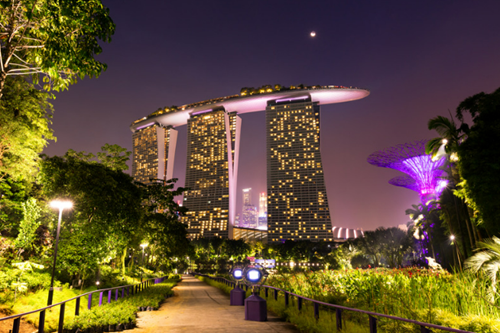
Budget:
- Outdoor Gardens: Free (Supertree Grove and outdoor areas)
- Flower Dome & Cloud Forest Conservatories: $28 for adults, $15 for children
- OCBC Skyway: $8 for adults, $5 for children
Total Estimate: $0 to $36 per person, depending on which areas you choose to visit
2. Visit Sentosa Island
- Resort Attractions: Sentosa is packed with attractions that make it a great destination for families and thrill-seekers alike. Top attractions include Universal Studios Singapore, Adventure Cove Waterpark, and S.E.A. Aquarium, one of the world’s largest aquariums.
- Beaches: Sentosa has three main beaches—Siloso, Palawan, and Tanjong—where you can relax, swim, or try activities like zip-lining and beach volleyball. Siloso Beach is known for its lively atmosphere, while Tanjong Beach offers a quieter retreat.
- Skyline Luge and Skyride: For some adventure, try the Skyline Luge, a unique gravity-fueled go-kart, or take the Skyride for panoramic views of the island.
- Sentosa Merlion: The 37-meter-tall Merlion statue on Sentosa offers stunning views from its viewing deck and mouth, though it’s currently undergoing renovations until further notice.
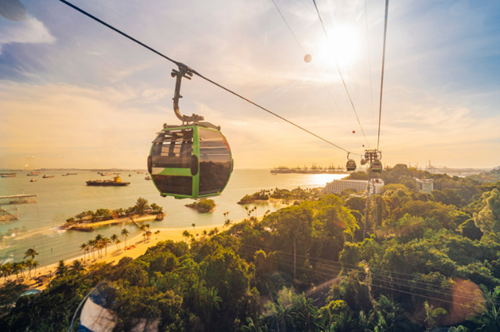
Budget:
- Sentosa Island Entrance: $3 to $6 by monorail or cable car, free if walking
- Universal Studios Singapore: $76 for adults, $56 for children
- Adventure Cove Waterpark: $39 for adults, $31 for children
- S.E.A. Aquarium: $43 for adults, $32 for children
Total Estimate: $6 to $200+ per person, depending on the attractions you choose.
3. Shop on Orchard Road
- Shopping Paradise: Orchard Road is Singapore’s premier shopping belt, lined with a mix of luxury brands, local boutiques, and high-street stores. Some of the most popular malls include ION Orchard, Ngee Ann City (home to the Takashimaya department store), and Paragon.
- Unique Finds: For unique, artisanal products, check out the independent stores along Orchard Gateway and TANGS, a department store that specializes in local and Asian products.
- Dining and Nightlife: Orchard Road also boasts a variety of restaurants, cafes, and rooftop bars. In the evenings, you can unwind at one of the many alfresco lounges or enjoy the vibrant nightlife scene.
Budget:
- Shopping: Varies widely depending on stores; high-end boutiques and luxury brands are pricey, but there are also affordable options.
- Dining: Budget $15 to $30 for meals at casual cafes, while upscale dining may cost $50 or more.
Total Estimate: Shopping and dining budgets vary widely, but a casual shopping trip with a meal could range from $50 to $100+ per person.
4. Take a River Cruise
- Scenic Views: A river cruise along the Singapore River is a relaxing way to see Singapore’s iconic landmarks from a different perspective. Cruises typically pass through Clarke Quay, Boat Quay, and Marina Bay, offering views of colonial-era buildings, colorful shophouses, and modern skyscrapers.
- Highlights: You’ll see famous landmarks like the Merlion statue, Esplanade – Theatres on the Bay, and Fullerton Hotel. Many cruises are especially beautiful at night when the city lights reflect off the water.
- Dinner Cruises: For an upgraded experience, consider booking a dinner cruise that lets you enjoy Singapore’s skyline while dining on local dishes.
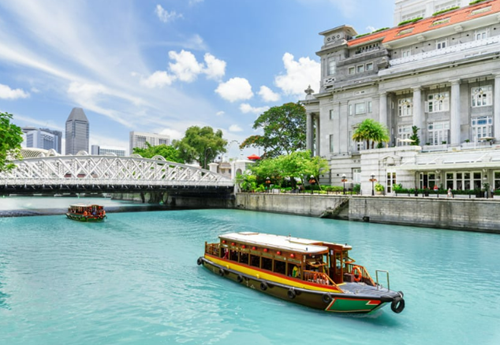
Budget:
- Regular River Cruise: $25 per person for a 40-minute cruise
- Dinner Cruise: $120+ per person for a dining experience on the river
Total Estimate: $25 to $150 per person, depending on the cruise type.
5. Visit Chinatown and Little India
- Chinatown: Singapore’s Chinatown is rich in history and offers a unique blend of old and new. Visit the Buddha Tooth Relic Temple for its intricate design, and explore Chinatown Street Market for souvenirs, snacks, and handicrafts. Chinatown is also known for its hawker centers, like Maxwell Food Centre, where you can sample famous dishes like Hainanese chicken rice.
- Little India: Little India is colorful, lively, and filled with cultural landmarks. You’ll find Sri Veeramakaliamman Temple, a beautiful Hindu temple, along with Tekka Centre for affordable local eats. This neighborhood is also known for its street art, vibrant markets, and shops selling spices, textiles, and jewelry.
- Cultural Experiences: Both areas are ideal for walking tours, giving visitors a glimpse into Singapore’s multicultural identity through its food, architecture, and festivals.
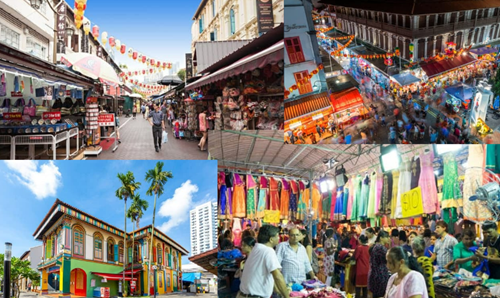
Budget:
- Cultural Landmarks: Free entry for most temples and heritage sites, though some request small donations (optional).
- Meals at Hawker Centers: $5 to $10 per person for a filling meal
- Shopping: Budget $10 to $50 for souvenirs or handicrafts
Total Estimate: $15 to $60 per person, depending on shopping and dining choices.
6. Experience the Night Safari
- What Makes It Unique: The Night Safari is the world’s first nocturnal zoo and provides a rare opportunity to observe animals in a nighttime setting. Unlike traditional zoos, the Night Safari features open, natural habitats and low-lighting environments that mimic the wild.
- Animal Exhibits: Spot over 900 animals from around the world, including tigers, leopards, and elephants, as well as unique creatures like the Malayan tapir and Asian elephants.
- Walking Trails and Tram Rides: There are four walking trails, each offering a unique view of different habitats. If you prefer to sit back, the tram ride is a convenient way to cover more ground and listen to a guide explain the different zones and animals.
- Shows and Dining: After your safari, catch the Creatures of the Night show, a live animal performance, or dine at one of the themed restaurants within the Night Safari park.
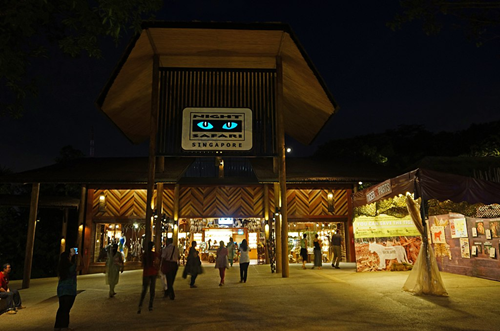
Budget:
- Night Safari Admission: $55 for adults, $38 for children
- Tram Ride: Included in admission
Total Estimate: $38 to $55 per person.
7. Explore Jewel Changi Airport
- Rain Vortex: Jewel Changi Airport is an attraction on its own, with the world’s tallest indoor waterfall, the Rain Vortex, at its center. Surrounded by lush indoor gardens, it’s an incredible sight and makes for an impressive welcome or farewell from Singapore.
- Sky Nets and Canopy Park: Jewel offers various interactive attractions like the Sky Nets (bouncing nets and walking nets), the Mirror Maze, and the Canopy Park with topiary sculptures and discovery slides.
- Shopping and Dining: Jewel Changi has over 280 retail outlets, making it a great place for last-minute shopping or dining before your flight. From local favorites to international brands, there’s something for everyone here.
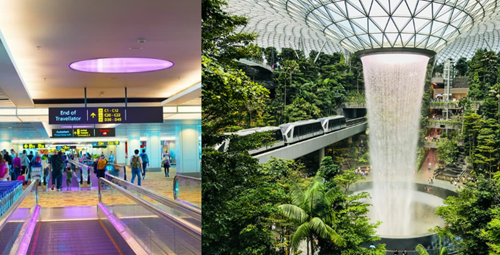
Budget:
- Rain Vortex: Free (viewing access)
- Sky Nets, Canopy Park, and Other Attractions: Combo tickets available, starting at around $10 for individual attractions or $28 for a bundle pass.
Total Estimate: $0 to $28+ per person, depending on selected activities.
8. Visit Marina Bay Sands and the SkyPark
- Infinity Pool: Marina Bay Sands is an iconic hotel with a striking design and the world-famous Infinity Pool. The pool is accessible only to hotel guests, but visitors can still enjoy the SkyPark Observation Deck for a panoramic view of the Singapore skyline and beyond.
- ArtScience Museum: Located adjacent to the hotel, the ArtScience Museum is an architectural marvel that houses rotating exhibitions focused on art, science, and technology.
- Spectra Light and Water Show: At night, catch the Spectra Light and Water Show by the waterfront. This multimedia show combines music, lights, and water effects, and it’s free for all to enjoy.
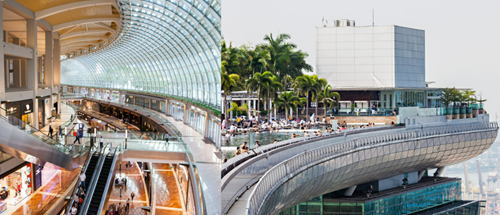
Budget:
- SkyPark Observation Deck: $26 for adults, $20 for children
- Spectra Light and Water Show: Free
Total Estimate: $0 to $26 per person, depending on access to the SkyPark.
9. Explore Kampong Glam and Haji Lane
- Sultan Mosque: Kampong Glam is known for the stunning Sultan Mosque, a golden-domed mosque with a rich history. This area has a unique charm, blending Malay heritage with modern art and culture.
- Haji Lane: Haji Lane is a trendy, narrow street lined with colorful murals, quirky boutiques, and cafes. It’s popular among locals and tourists for its unique vibe and is one of Singapore’s best places for Instagram-worthy photos.
- Arab Street: In addition to Haji Lane, Arab Street is filled with shops selling carpets, textiles, and traditional crafts, making it a great area for a leisurely afternoon stroll.
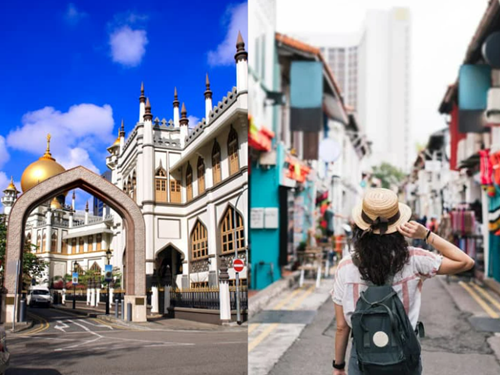
Budget:
- Sultan Mosque: Free entry, though small donations are welcome
- Shopping and Dining: Expect to spend $10 to $50 on meals and souvenirs
Total Estimate: $10 to $50 per person, depending on dining and shopping choices.
10. Relax at East Coast Park
- Beach Activities: East Coast Park is a favorite among locals for outdoor recreation. With over 15 kilometers of coastline, it’s ideal for swimming, cycling, and jogging. You can rent bicycles, rollerblades, or even try kayaking.
- Seafood and Dining: The East Coast Lagoon Food Village offers some of the best seafood in Singapore, including barbecued stingray and chili crab.
- BBQ and Camping: The park has designated BBQ and camping areas where you can relax with friends or family. It’s a great spot to spend a quiet day away from the city’s hustle and bustle.
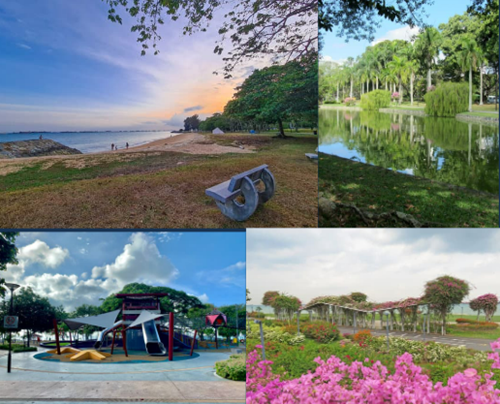
Budget:
- Park Entry: Free
- Bike Rentals or Activities: $8 to $12 per hour for bike rentals, with other activities like kayaking costing around $20 per hour.
- Seafood Dining: Casual hawker-style meals range from $5 to $20; upscale dining may cost $50+ per person.
Total Estimate: $5 to $50 per person, depending on activities and dining.
Bonus: Universal Studios Singapore
- Budget:
- Standard Admission: $76 for adults, $56 for children
- Express Pass (Optional): $40 to $70, depending on the day and demand
- Dining and Souvenirs: Budget an additional $20 to $50 for food and merchandise
- Total Estimate: $76 to $150+ per person, including express passes and meals.
Summary of Estimated Costs for Top Activities
| Activity | Estimated Cost (SGD) |
|---|---|
| Gardens by the Bay | $0 to $36 |
| Sentosa Island Attractions | $6 to $200+ |
| Orchard Road Shopping & Dining | $50 to $100+ |
| Singapore River Cruise | $25 to $150 |
| Chinatown & Little India | $15 to $60 |
| Night Safari | $38 to $55 |
| Jewel Changi Airport | $0 to $28 |
| Marina Bay Sands SkyPark | $0 to $26 |
| Kampong Glam & Haji Lane | $10 to $50 |
| East Coast Park | $5 to $50 |
| Universal Studios Singapore | $76 to $150+ |
These estimated budgets make Singapore accessible for a variety of travel styles, from budget-friendly explorations to more indulgent experiences. Planning with these costs in mind can help you enjoy all that Singapore has to offer, making it a must-visit city for travelers seeking a unique and memorable adventure.
The Best Food to Try in Singapore
From hawker centers to fine dining restaurants, Singapore’s food scene is diverse and vibrant. Here are some of the most iconic dishes you shouldn’t miss, along with the best places to try them.
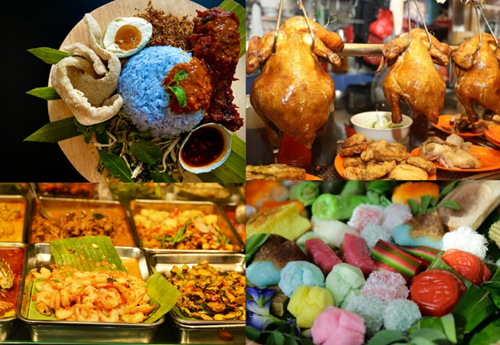
1. Hainanese Chicken Rice
- Description: Known as Singapore’s national dish, Hainanese chicken rice features poached chicken with fragrant rice cooked in chicken broth, accompanied by light soy sauce, fresh ginger, and chili. Its simplicity is deceptive, as each element is carefully prepared for maximum flavor.
- Where to Try It:
- Tian Tian Hainanese Chicken Rice at Maxwell Food Centre
- Chatterbox at Hilton Singapore Orchard for a high-end version
- Cost: $4 to $8 at hawker centers, $25+ at restaurants
2. Chili Crab
- Description: This iconic Singaporean seafood dish features whole crabs coated in a thick, sweet, and spicy tomato-based sauce. It’s best enjoyed by hand with fried mantou (buns) to soak up the delicious sauce.
- Where to Try It:
- Jumbo Seafood along East Coast Road
- Long Beach Seafood Restaurant on Dempsey Hill
- Cost: $60+ per serving, as the price depends on the crab’s weight
3. Laksa
- Description: Laksa is a spicy noodle soup with Peranakan (Straits Chinese) roots, featuring thick rice noodles in a creamy coconut milk-based broth, usually topped with shrimp, fish cakes, and tofu. The broth is rich, fragrant, and slightly spicy, with flavors of lemongrass, shrimp paste, and coconut.
- Where to Try It:
- 328 Katong Laksa on East Coast Road, known for its no-chopsticks approach (spoons only!)
- Sungei Road Laksa at Jalan Besar for an authentic, old-school experience
- Cost: $4 to $6 per bowl
4. Satay
- Description: Satay is skewered, grilled meat (usually chicken, beef, or lamb) served with peanut sauce, rice cakes (ketupat), and fresh cucumber and onions. This beloved street food is smoky, savory, and slightly sweet, with flavors that come alive when dipped in the rich peanut sauce.
- Where to Try It:
- Lau Pa Sat Festival Market, a famous hawker center that transforms into a satay street at night
- East Coast Lagoon Food Village, known for its BBQ satay stalls
- Cost: $6 to $10 for a set of skewers
5. Kaya Toast with Soft-Boiled Eggs
- Description: Kaya toast is a traditional breakfast or snack option, featuring slices of toast with kaya (coconut and egg jam) and butter. It’s typically served with soft-boiled eggs seasoned with soy sauce and pepper, and a cup of local coffee or tea.
- Where to Try It:
- Ya Kun Kaya Toast (multiple outlets)
- Tong Ah Eating House in Chinatown
- Cost: $4 to $6 per set
6. Char Kway Teow
- Description: Char Kway Teow is a stir-fried noodle dish with flat rice noodles, Chinese sausage, shrimp, eggs, and bean sprouts. Cooked over high heat with dark soy sauce, it’s a flavorful dish with a hint of sweetness and a slightly smoky flavor from the wok.
- Where to Try It:
- Hill Street Char Kway Teow at Bedok South Market & Food Centre
- Outram Park Fried Kway Teow Mee at Hong Lim Market & Food Centre
- Cost: $4 to $6 per plate
7. Bak Kut Teh
- Description: Bak Kut Teh, or “pork rib tea,” is a Chinese soup featuring tender pork ribs simmered in a fragrant broth of garlic, pepper, and various spices. It’s typically served with rice, fried dough sticks (youtiao), and pickled vegetables.
- Where to Try It:
- Founder Bak Kut Teh on Balestier Road
- Song Fa Bak Kut Teh near Clarke Quay
- Cost: $6 to $12 per bowl
8. Hokkien Mee
- Description: Hokkien Mee is a noodle dish made from a mix of yellow noodles and rice vermicelli, stir-fried with eggs, prawns, squid, and pork belly in a savory prawn and seafood stock. It’s typically served with a side of sambal chili and a squeeze of lime for added flavor.
- Where to Try It:
- Nam Sing Hokkien Fried Mee at Old Airport Road Food Centre
- Geylang Lorong 29 Hokkien Mee
- Cost: $4 to $8 per plate
9. Roti Prata
- Description: Roti Prata is a crispy, flaky flatbread of Indian origin, often served with a side of curry. It’s a popular breakfast item but can be enjoyed any time of day. Some places also offer variations like egg, cheese, or even chocolate-filled prata.
- Where to Try It:
- Mr. and Mrs. Mohgan’s Super Crispy Roti Prata at Joo Chiat Road
- Springleaf Prata Place for a wide variety of innovative prata dishes
- Cost: $1 to $4 per piece, depending on the filling
10. Nasi Lemak
- Description: Nasi Lemak is a Malay-inspired rice dish with coconut-infused rice, served with fried anchovies, peanuts, cucumber, a fried egg, and sambal chili. Some versions come with fried chicken or fish on the side.
- Where to Try It:
- Adam Road Food Centre for authentic nasi lemak
- The Coconut Club for a premium version with top-quality ingredients
- Cost: $3 to $12, depending on the location and accompaniments
11. Durian
- Description: Durian, known as the “king of fruits,” is a divisive but iconic part of Singapore’s food culture. With a unique aroma and creamy texture, durian is available at many fruit stalls around the city, and it’s best enjoyed fresh.
- Where to Try It:
- Geylang Durian Street at Geylang Road for fresh durian
- Combat Durian at Balestier Road, popular for high-quality varieties
- Cost: $20 to $80 per fruit, depending on the variety and season
12. Singapore Sling
- Description: The Singapore Sling is a famous cocktail invented at the Raffles Hotel in the early 1900s. Made with gin, cherry liqueur, and fruit juices, it’s a sweet and refreshing drink often enjoyed by tourists.
- Where to Try It:
- Long Bar at Raffles Hotel, where the drink was originally created
- Other cocktail bars around the city offer versions of this iconic drink
- Cost: $30 to $35 at the Long Bar
Street Food and Hawker Center Culture
While some dishes above can be found at various levels of dining establishments, Singapore’s hawker centers offer a unique and affordable way to try these iconic foods. Some of the best hawker centers include:
- Maxwell Food Centre: Famous for its variety and iconic stalls like Tian Tian Hainanese Chicken Rice.
- Lau Pa Sat: A historical food center with a focus on satay and local specialties.
- Old Airport Road Food Centre: Known for Hokkien mee, char kway teow, and other classic Singaporean dishes.
- Chinatown Complex Food Centre: Great for affordable Chinese and Malay dishes, including Michelin-starred hawker stalls.
The variety and quality of food in Singapore’s hawker centers make them an essential part of the local food experience. Whether you’re indulging in a full meal or sampling dishes from multiple stalls, these centers are affordable and embody Singapore’s culinary diversity.
Where to Stay in Singapore
Singapore offers a range of accommodation choices to suit every type of traveler. Whether you’re looking to save money on lodging or want a mid-range hotel with extra comforts, here are some of the best options, with price ranges to guide you.
Budget-Friendly Stays (SGD $30 to $100 per night)
Staying in budget-friendly accommodations in Singapore doesn’t mean compromising on comfort or location. Hostels and budget hotels are often found in central neighborhoods, making it convenient for sightseeing.
- Capsule Pods @ Chinatown: This capsule hotel offers private pods with personal lights, outlets, and a bit of privacy, while providing shared facilities like bathrooms and lounge areas.
- Location: Chinatown, close to Chinatown MRT Station and major cultural sites
- Cost: SGD $30 to $60 per night, depending on the season
- Why Stay Here: Great for solo travelers who want a central location without high costs. It’s also located near many food spots and historical areas.
- Blue Jazz Hostel: This vibrant hostel offers dorm rooms and a social atmosphere, with an on-site bar and cafe. Guests can choose from mixed or female-only dorms.
- Location: Little India, near Bugis Street and Mustafa Centre
- Cost: SGD $35 to $60 per night
- Why Stay Here: The lively environment makes it ideal for meeting other travelers. Plus, Little India is known for affordable shopping and dining.
- Hotel 81 (Multiple Locations): Hotel 81 is a chain of budget hotels offering private rooms with basic amenities. Rooms are small but clean, with en-suite bathrooms, Wi-Fi, and air conditioning.
- Location: Various neighborhoods, including Bugis, Chinatown, and Geylang
- Cost: SGD $70 to $90 per night
- Why Stay Here: With locations across the city, Hotel 81 provides a consistent, budget-friendly stay option that’s suitable for both solo travelers and couples.
- The Pod Boutique Capsule Hotel: This modern capsule hotel offers private pods in dorm-style rooms, with free breakfast, Wi-Fi, and shared bathroom facilities.
- Location: Beach Road, close to Bugis and Kampong Glam
- Cost: SGD $50 to $80 per night
- Why Stay Here: A slightly upscale capsule experience with a chic, minimalist design, perfect for travelers seeking a comfortable yet affordable option.
Mid-Priced Hotels (SGD $100 to $250 per night)
If you’re looking for a bit more comfort, mid-priced hotels in Singapore offer modern amenities, larger rooms, and convenient locations near top attractions.
- Hotel Boss: Hotel Boss offers modern, compact rooms with amenities such as free Wi-Fi, an on-site pool, gym, and multiple dining options. It’s within walking distance of Lavender MRT station.
- Location: Lavender, near Kampong Glam and Little India
- Cost: SGD $100 to $150 per night
- Why Stay Here: This hotel’s excellent location and amenities make it a great value for both leisure and business travelers.
- Ibis Singapore on Bencoolen: Part of the Ibis chain, this eco-friendly hotel offers cozy rooms with amenities such as Wi-Fi, a 24-hour bar, and an international restaurant.
- Location: Bencoolen Street, close to Bugis and Little India
- Cost: SGD $120 to $180 per night
- Why Stay Here: The central location provides easy access to shopping areas like Bugis Street and Orchard Road, making it ideal for visitors who want to explore.
- Hotel G Singapore: This trendy hotel has a chic, Instagram-worthy design, offering compact rooms with high-quality bedding, free Wi-Fi, and a gym. Dining options include a French-American restaurant and a cozy bar.
- Location: Middle Road, close to Bugis and Dhoby Ghaut
- Cost: SGD $150 to $200 per night
- Why Stay Here: Known for its style and comfort, Hotel G is perfect for travelers who want an aesthetically pleasing space to unwind after a day of exploring.
- Village Hotel Bugis by Far East Hospitality: This hotel offers larger rooms with a mix of modern and local decor. It has a rooftop pool, fitness center, and several restaurants serving international and local cuisine.
- Location: Bugis, near Kampong Glam and Little India
- Cost: SGD $180 to $230 per night
- Why Stay Here: Its location near Bugis MRT station and popular areas like Arab Street and Little India make it ideal for travelers looking to explore cultural neighborhoods.
- Holiday Inn Express Singapore Clarke Quay: Offering modern rooms with city views, this hotel has a rooftop pool, a fitness center, and free breakfast. The rooms are designed with comfort and convenience in mind.
- Location: Clarke Quay, near Singapore River and nightlife spots
- Cost: SGD $200 to $250 per night
- Why Stay Here: The proximity to Clarke Quay’s nightlife and dining options makes it great for travelers who want to explore the lively evening scene.
Summary of Accommodation Options and Estimated Costs
| Accommodation | Location | Type | Estimated Cost (SGD) |
|---|---|---|---|
| Capsule Pods @ Chinatown | Chinatown | Capsule Hotel | $30 – $60 |
| Blue Jazz Hostel | Little India | Hostel | $35 – $60 |
| Hotel 81 | Various (Bugis, Chinatown) | Budget Hotel | $70 – $90 |
| The Pod Boutique Capsule Hotel | Beach Road, Bugis | Capsule Hotel | $50 – $80 |
| Hotel Boss | Lavender | Mid-Range Hotel | $100 – $150 |
| Ibis Singapore on Bencoolen | Bencoolen Street | Mid-Range Hotel | $120 – $180 |
| Hotel G Singapore | Middle Road, Bugis | Trendy Hotel | $150 – $200 |
| Village Hotel Bugis | Bugis | Mid-Range Hotel | $180 – $230 |
| Holiday Inn Express Clarke Quay | Clarke Quay | Mid-Range Hotel | $200 – $250 |
Whether you’re looking to stick to a budget or enjoy a bit of luxury, Singapore’s accommodations offer options to suit all types of travelers. With this variety, you’re bound to find a comfortable and convenient place to rest while enjoying everything that makes Singapore a must-visit city.
Why Singapore is a Must-Visit City
Singapore is more than just a city; it’s an experience of culture, flavor, and unforgettable sights. Whether you’re wandering the lush landscapes of Gardens by the Bay, taking in the urban views from Marina Bay Sands, or enjoying the culinary wonders at a local hawker center, there’s always something that captures the essence of what makes Singapore a must-visit city. The city’s unique blend of tradition and modernity, combined with its commitment to sustainability and innovation, makes it a top choice for travelers from around the globe.
If you’re planning your next getaway, look no further than Singapore. With its welcoming atmosphere, diverse culture, and endless attractions, Singapore promises an enriching experience. This city leaves a lasting impression, inviting you back time and again to uncover even more of its charm and vibrancy. So pack your bags, bring your appetite, and get ready to explore one of the world’s most fascinating cities. Singapore awaits!



